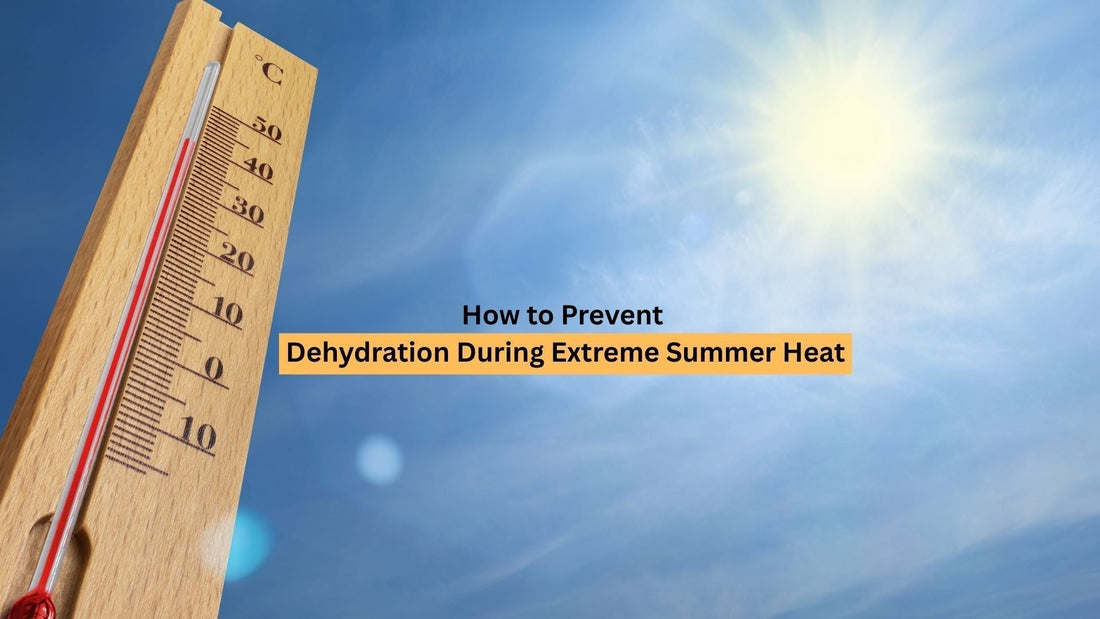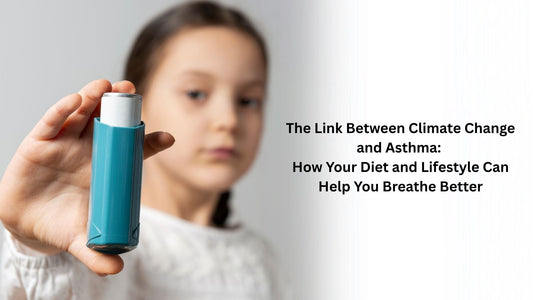
How to Prevent Dehydration During Extreme Summer Heat
Tips for Staying Hydrated
The summer heat can be overwhelming, and dehydration is a serious risk when the temperatures soar. Whether you're spending time outdoors or simply going about your daily routine, staying hydrated is crucial to maintain your health and well-being. In this blog, we'll share practical tips and strategies to prevent dehydration during extreme summer heat and ensure you stay cool and hydrated all season long.
Why Is Dehydration a Concern in Summer?
Dehydration occurs when your body loses more fluids than it takes in, leading to an imbalance that can disrupt essential bodily functions. During the hot summer months, you're at a higher risk of dehydration due to increased sweating, which causes your body to lose water and electrolytes. Without adequate fluid intake, you may experience symptoms such as fatigue, dizziness, dry mouth, headache, and muscle cramps.
1. Drink Plenty of Water
The simplest and most effective way to prevent dehydration is to drink water consistently throughout the day. Aim to drink at least 8–10 glasses (2–2.5 liters) of water daily, and more if you're outdoors or engaging in physical activity. Carry a reusable water bottle with you so you can easily sip water throughout the day.
Pro Tip: Add a pinch of salt and a splash of lemon to your water to replenish lost electrolytes, which will help your body absorb water more effectively.
2. Eat Hydrating Foods
Did you know that certain foods can help keep you hydrated? Incorporate water-rich fruits and vegetables into your diet, such as:
● Watermelon: Packed with water and refreshing, perfect for summer.
● Cucumber: Contains 96% water, making it one of the best hydrating snacks.
● Oranges: High in vitamin C and water content, great for rehydrating.
Including these hydrating foods in your meals will help supplement your water intake and keep you feeling refreshed.
3. Avoid Sugary and Caffeinated Beverages
While sugary sodas and caffeinated drinks like coffee and energy drinks may seem refreshing, they can actually contribute to dehydration. These beverages act as diuretics, causing your body to lose more fluids. Opt for water, herbal teas, or coconut water to hydrate without the risk of dehydration.
Tip: If you're craving a refreshing drink, try iced herbal tea or coconut water, which not only hydrates but also replenishes essential electrolytes.
4. Stay Cool and Seek Shade
Exposure to extreme heat can cause your body to sweat excessively, increasing your risk of dehydration. To stay cool and prevent overheating, avoid direct sunlight during the hottest part of the day (usually between 10 AM and 4 PM). If you need to be outdoors, seek shade or use an umbrella, wide-brimmed hat, or cooling towel to protect yourself from the sun.
Pro Tip: Use a handheld fan or cooling mist to help regulate your body temperature while outside.
5. Replenish Electrolytes
Electrolytes are minerals like sodium, potassium, and magnesium that help maintain fluid balance in your body. When you're sweating heavily, you lose electrolytes along with water, which can lead to dehydration and imbalances. To prevent this, consider drinking an electrolyte-enhanced beverage or adding electrolyte-rich foods (like bananas, spinach, and coconut water) to your diet.
Pro Tip: Prepare your own homemade electrolyte drink by mixing water with a pinch of salt, a splash of lemon, and a little honey or maple syrup for natural sweetness.
6. Wear Light, Breathable Clothing
Wearing tight, dark-colored, or heavy clothing can trap heat and make you sweat more, increasing your risk of dehydration. Instead, opt for lightweight, loose-fitting, and light-colored clothes made from breathable fabrics like cotton or linen. This will help your body stay cool and reduce the amount of sweat produced.
7. Take Regular Breaks in Cool Areas
If you're exercising or working outdoors, be sure to take breaks in a cool area (such as an air-conditioned room or shaded spot) to prevent heat exhaustion. Sitting in a cool place allows your body to recover, maintain hydration, and lower your body temperature before you resume activity.
8. Monitor Your Urine Color
One of the easiest ways to track your hydration status is by observing the color of your urine. If your urine is light yellow or clear, it's a sign that you're properly hydrated. If it's dark yellow or amber, it may indicate that you're dehydrated and need to drink more water.
Tip: Aim to urinate every 3–4 hours to ensure you're staying hydrated throughout the day.
9. Be Cautious When Exercising in the Heat
Exercise is important for staying healthy, but it’s essential to take extra precautions during extreme heat. If you're planning to work out outdoors, try to do so during the cooler early morning or evening hours. Always hydrate before, during, and after exercise, and avoid overexerting yourself.
10. Know the Signs of Dehydration
If you do start to feel dehydrated, it's important to recognize the warning signs so you can take action quickly. Symptoms of dehydration include:
-
Dry mouth or throat
- Fatigue or dizziness
-
Dark-colored urine
- Headache
- Rapid heartbeat or breathing
If you experience any of these symptoms, drink water immediately, rest in a cool place, and consider consuming an electrolyte beverage.
Preventing dehydration during extreme summer heat is crucial for your health and well-being. By drinking plenty of water, eating hydrating foods, staying cool, and replenishing electrolytes, you can enjoy the summer months without the risk of dehydration. Keep these tips in mind to stay hydrated, healthy, and energized all season long!


